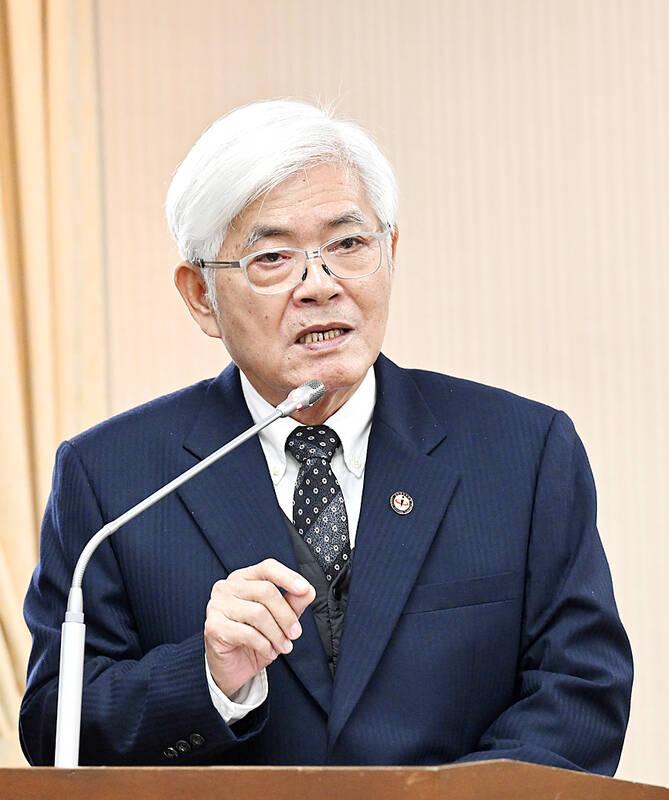If the Central Election Commission (CEC) approves the second-stage recall petitions it has received, voting would likely take place between July 10 and Aug. 19, commission Chairman Lee Chin-yung (李進勇) said today.
The CEC is scheduled to meet on Friday next week to review 26 second-stage recall petitions, Lee said prior to a meeting of the Legislative Yuan’s Internal Administration Committee on a proposal to unfreeze the CEC’s budget for this year.
The Public Officials Election and Recall Act (公職人員選舉罷免法) requires that a recall vote be held 20 to 60 days after a recall is declared, with results announced within seven days after the polls have closed.

Photo: Lo Pei-de, Taipei Times
All second-stage recall petition documents have been submitted to the CEC, Lee said, adding that the objective of next week's meeting is to review the documents and determine if the recall campaigns can continue to the next stage.
If additional documents are required, the CEC would ask recall conveners to submit them as soon as possible, he added.
If any recalls are approved at the meeting, voting would have to occur between July 10 and Aug. 19, leaving six Saturdays available, Lee said.
Responding to rumors that recall votes would be held on July 26, Lee said that while that day is an option, it is not the guaranteed choice.
The CEC hopes to minimize social costs, including the administrative burden of carrying out recall votes, Lee said.
The CEC would likely recommend that any recall votes approved on Friday next week be scheduled on the same day, as they would all have the same 20 to 60 day window, Lee said.
In light of the possible recall votes, Chinese Nationalist Party (KMT) Chairman Eric Chu (朱立倫) yesterday said that the party would enter "combat mode" and launch a nationwide campaign to rally support for its lawmakers.
Recall bids have been launched against 50 lawmakers — 35 from the KMT and 15 from the ruling Democratic Progressive Party (DPP) — as well as Hsinchu Mayor Ann Kao (高虹安) and eight county and city councilors, according to the CEC.
To pass the first stage, petitioners must collect signatures from at least 1 percent of eligible voters in a constituency. In the second stage, the threshold rises to 10 percent.
As of today, the CEC has ruled that four proposals targeting KMT lawmakers failed to gather enough signatures in the second stage to proceed.
Meanwhile, most recall campaigns targeting DPP lawmakers either did not collect enough signatures before the 60-day second stage deadline or are ongoing. Four campaigns remain active.

The manufacture of the remaining 28 M1A2T Abrams tanks Taiwan purchased from the US has recently been completed, and they are expected to be delivered within the next one to two months, a source said yesterday. The Ministry of National Defense is arranging cargo ships to transport the tanks to Taiwan as soon as possible, said the source, who is familiar with the matter. The estimated arrival time ranges from late this month to early next month, the source said. The 28 Abrams tanks make up the third and final batch of a total of 108 tanks, valued at about NT$40.5 billion

Two Taiwanese prosecutors were questioned by Chinese security personnel at their hotel during a trip to China’s Henan Province this month, the Mainland Affairs Council (MAC) said yesterday. The officers had personal information on the prosecutors, including “when they were assigned to their posts, their work locations and job titles,” MAC Deputy Minister and spokesman Liang Wen-chieh (梁文傑) said. On top of asking about their agencies and positions, the officers also questioned the prosecutors about the Cross-Strait Joint Crime-Fighting and Judicial Mutual Assistance Agreement, a pact that serves as the framework for Taiwan-China cooperation on combating crime and providing judicial assistance, Liang

A group from the Taiwanese Designers in Australia association yesterday represented Taiwan at the Midsumma Pride March in Melbourne. The march, held in the St. Kilda suburb, is the city’s largest LGBTQIA+ parade and the flagship event of the annual Midsumma Festival. It attracted more than 45,000 spectators who supported the 400 groups and 10,000 marchers that participated this year, the association said. Taiwanese Designers said they organized a team to march for Taiwan this year, joining politicians, government agencies, professionals and community organizations in showing support for LGBTQIA+ people and diverse communities. As the first country in Asia to legalize same-sex

MOTIVES QUESTIONED The PLA considers Xi’s policies toward Taiwan to be driven by personal considerations rather than military assessment, the Epoch Times reports Chinese President Xi Jinping’s (習近平) latest purge of the Chinese People’s Liberation Army (PLA) leadership might have been prompted by the military’s opposition to plans of invading Taiwan, the Epoch Times said. The Chinese military opposes waging war against Taiwan by a large consensus, putting it at odds with Xi’s vision, the Falun Gong-affiliated daily said in a report on Thursday, citing anonymous sources with insight into the PLA’s inner workings. The opposition is not the opinion of a few generals, but a widely shared view among the PLA cadre, the Epoch Times cited them as saying. “Chinese forces know full well that